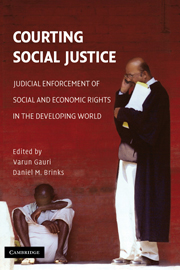Crossref Citations
This Book has been
cited by the following publications. This list is generated based on data provided by Crossref.
Darrow, Mac
and
Arbour, Louise
2009.
The Pillar of Glass: Human Rights in the Development Operations of the United Nations.
American Journal of International Law,
Vol. 103,
Issue. 3,
p.
446.
2009.
BOOKS RECEIVED.
International and Comparative Law Quarterly,
Vol. 58,
Issue. 3,
p.
749.
French, John D.
and
Wintersteen, Kristin
2009.
Crafting an International Legal Regime for Worker Rights: Assessing the Literature since the 1999 Seattle WTO Protests.
International Labor and Working-Class History,
Vol. 75,
Issue. 1,
p.
145.
Woods, Patricia J.
and
Hilbink, Lisa
2009.
Comparative Sources of Judicial Empowerment.
Political Research Quarterly,
Vol. 62,
Issue. 4,
p.
745.
Langford, Malcolm
2009.
Social Rights Jurisprudence.
p.
3.
Domingo, Pilar
2010.
Cultures of Legality.
p.
254.
Zapata Vásquez, Neyer
2010.
El Tribunal Constitucional De Bolivia Y La Generación/Supresión De Desigualdades (The Bolivian Constitutional Court in the creation or elimination of inequalities).
SSRN Electronic Journal,
Hornberger, Julia
2010.
Human Rights and Policing: Exigency or Incongruence?.
Annual Review of Law and Social Science,
Vol. 6,
Issue. 1,
p.
259.
Brinks, Daniel M.
2011.
Courts in Latin America.
p.
128.
Kapiszewski, Diana
2011.
Courts in Latin America.
p.
154.
Tiede, Lydia Brashear
and
Ponce, Aldo Fernando
2011.
Ruling against the Executive in Amparo Cases: Evidence from the Peruvian Constitutional Tribunal.
Journal of Politics in Latin America,
Vol. 3,
Issue. 2,
p.
107.
Helmke, Gretchen
and
Ríos-Figueroa, Julio
2011.
Courts in Latin America.
p.
1.
Helmke, Gretchen
and
Staton, Jeffrey K.
2011.
Courts in Latin America.
p.
306.
Schrecker, Ted
2011.
The Health Case for Economic and Social Rights Against the Global Marketplace.
Journal of Human Rights,
Vol. 10,
Issue. 2,
p.
151.
Gauri, Varun
2011.
The cost of complying with human rights treaties: The convention on the rights of the child and basic immunization.
The Review of International Organizations,
Vol. 6,
Issue. 1,
p.
33.
Rutledge, Jennifer Geist
2012.
Courts as Entrepreneurs: The Case of the Indian Mid‐Day Meals Programme.
Asian Politics & Policy,
Vol. 4,
Issue. 4,
p.
527.
Gauri, Varun
and
Brinks, Daniel M.
2012.
Human Rights as Demands for Communicative Action*.
Journal of Political Philosophy,
Vol. 20,
Issue. 4,
p.
407.
Udombana, Nsongurua J.
2012.
Keeping the Promise: Improving Access to Socioeconomic Rights in Africa.
SSRN Electronic Journal,
Desai, Deval
and
Woolcock, Michael
2012.
The Politics of Rule of Law Systems in Developmental States: ‘Political Settlements’ as a Basis for Promoting Effective Justice Institutions for Marginalized Groups.
SSRN Electronic Journal,
Littlejohns, Peter
Cubillos, Leonardo
Escobar, Maria‐Luisa
Pavlovic, Sebastian
and
Iunes, Roberto
2012.
Universal health coverage and litigation in Latin America.
Journal of Health Organization and Management,
Vol. 26,
Issue. 3,
p.
390.



